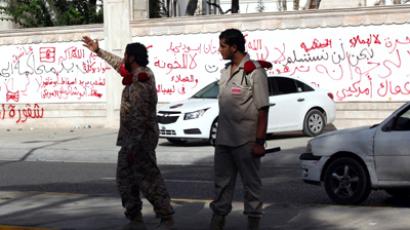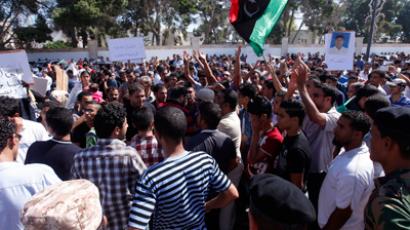A year on from Gaddafi’s death: Govt forces pummel Bani Walid
The Libyan army is continuing its assault of the anti-regime stronghold of Bani Walid for the second day. A year after the killing of Colonel Gaddafi the Libyan government seeks to crush the remnants of his loyalist followers entrenched in the town.
Fighting has gripped Bani Walid for the last two weeks as security forces and militia attempt to enter the town to arrest individuals accused of a series of kidnappings. “All the families are still here, nobody decided to leave,” a town official, Abdul Salem Al Fukahi, said in a telephone interview with Bloomberg. “They will stay in their homes and live or die.” Mohammed Megaryef, Libya’s de facto head of state after the Congress fired PM Mustafa Abushagur, said that the fight for is not over yet."The campaign to liberate the country has not been fully completed," Megaryef, the head of Libya's national assembly, said on state television on Saturday. He cited the “corruption and weakness” of some government bodies as the root cause for the “state of discontent and tension among different segments of society.”The fighting erupted earlier this week after militias allied to the Libyan army reportedly shelled the hilltop town. The violence comes after the kidnap, shooting and torture in Bani Walid of, Omran Ben Shaaban, credited with capturing Gaddafi last year. Shaban died of his injuries last month while undergoing treatment in Paris. It is widely believed he was killed by Gaddafi loyalists.
The General National Congress (GNC) said it would bring Mr. Shaaban’s killers to justice. It gave Bani Walid a deadline to hand him over and pro-government militias effectively put the town under siege for two weeks prior to Wednesday’s clashes. Amnesty International say hundreds of the town’s residents have been unlawfully taken into custody by militia groups and that the town has been left without food and medical supplies. Tribal elders tried to negotiate a solution and they hoped the army would be able to enter Bani Walid peacefully. But reports from inside the town said Friday it was still being shelled. There are also unconfirmed reports that chemical weapons may have been used in the fighting. Ali Alkasih, a spokesman for the Warfalla Tribe abroad – the same tribe which supported Gaddafi throughout his 42 year rule – told RT by email that chemical weapons had been used in the attack resulting in one death and dozens suffering from suffocation. He added that tanks and artillery had also been used, information based on personal sources in the town.RT was unable to verify these reports but Annie Machon, a former agent in Britain’s MI5, told RT that, “Gaddafi’s regime is reported to have stockpiled chemical weapons while in power so there is a possibility that there are still a lot of old chemical weapons floating about in Libya that might fall into rebel militia.” Although she added that she doubted that, “This stuff has been given to the official Libyan army and is being used against dissident populations.” Libya’s GNC has so far failed to curtail violence in the country and bring militant groups formed of former rebels under control.
A report by Human Right’s Watch released Wednesday revealed that the Libyan rebels who captured Gaddafi then abused and murdered him along with his son and loyalists.Sabah Al-Mukhtar, President of the Arab Lawyers Association described the finding to RT as no surprise and an “embarrassment” for NATO, given that they had backed the same militia groups. He added that government forces are not in control of the fragmented militias that still freely operate in Libya. “Their allegiance is not to Libya. Their allegiance is to their tribe, their town or their background,” He said. Machon explained that no matter how brutal Gaddafi had been, he did at least provide a certain degree of stability and quality of life. “Yes he could be brutal but that very strength allowed him to bring together the disparate tribes and corrupting religious, secular groups within Libya and taking away that control NATO abruptly removed any centralized power and the people are suffering for it now,” she said.














